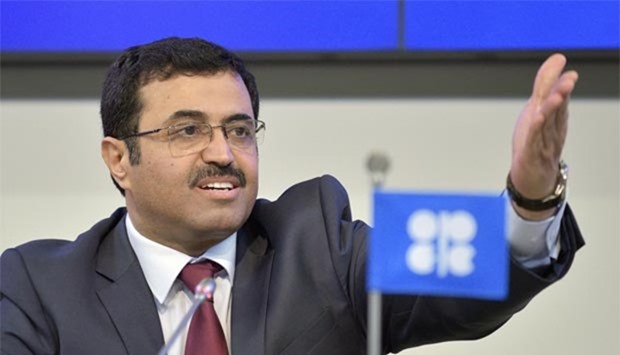Al-Sada, the current president of the Organisation of Petroleum Exporting Countries (Opec), said the group would hold informal talks at a conference in Algiers in September.
“Expectation of higher crude oil demand in the third and fourth quarters of 2016, coupled with decrease in availability, is leading the analysts to conclude that the current bear market is only temporary and oil price would increase during the later part of 2016,” al-Sada said in a statement on Monday.
"Opec continues to monitor developments closely and is in constant deliberations with all member states on ways and means to help restore stability and order to the oil market."
An informal meeting of Opec member countries is scheduled to take place on the sidelines of the International Energy Forum, which groups producers and consumers, in Algeria from September 26 to 28, the statement said.
Oil prices rose on Monday, lifted by reports of renewed talks by some members of the Organisation of the Petroleum Exporting Countries to restrain output, a Reuters dispatch said.
The price rise came on the back of renewed calls by some Opec members to freeze production in a bid to rein in output, a demand that non-Opec oil producing giant Russia was quick to dismiss.
Brent futures were up 15 cents at $44.42 a barrel on Monday; though still lag a 2016 high near $53 a barrel hit in June.
West Texas Intermediate crude rose to the highest in almost two weeks, gaining as much as 1.7% to $42.5 a barrel.
Oil tumbled into a bear market last week, ending a recovery that saw prices almost double from a 12-year low in February.
The renewed decline keeps pressure on many member countries that are still unable to balance their budgets, Bloomberg said. Opec ministers last met in June when they rejected a proposal to adopt a new output ceiling, sticking to a policy of unfettered production.
Al-Sada said “the latest drop in prices won’t last".
The recent slide in prices reflects weaker refining margins, a surplus of refined products, in addition to the UK’s vote to leave the European Union or Brexit and its impact on the financial markets.
Some Opec officials had said a revival of talks on a global oil production freeze could be discussed at an informal meeting of Opec and non-Opec in Algeria in September, if oil prices weaken, Reuters said.
Opec member Iran has been the main opponent of a freeze as it looks to raise its output to levels seen before the imposition of now-ended Western sanctions.
“Expectation of higher crude oil demand in the third and fourth quarters of 2016, coupled with decrease in availability, is leading the analysts to conclude that the current bear market is only temporary and oil price would increase during the later part of 2016,” al-Sada said in a statement on Monday.
"Opec continues to monitor developments closely and is in constant deliberations with all member states on ways and means to help restore stability and order to the oil market."
An informal meeting of Opec member countries is scheduled to take place on the sidelines of the International Energy Forum, which groups producers and consumers, in Algeria from September 26 to 28, the statement said.
Oil prices rose on Monday, lifted by reports of renewed talks by some members of the Organisation of the Petroleum Exporting Countries to restrain output, a Reuters dispatch said.
The price rise came on the back of renewed calls by some Opec members to freeze production in a bid to rein in output, a demand that non-Opec oil producing giant Russia was quick to dismiss.
Brent futures were up 15 cents at $44.42 a barrel on Monday; though still lag a 2016 high near $53 a barrel hit in June.
West Texas Intermediate crude rose to the highest in almost two weeks, gaining as much as 1.7% to $42.5 a barrel.
Oil tumbled into a bear market last week, ending a recovery that saw prices almost double from a 12-year low in February.
The renewed decline keeps pressure on many member countries that are still unable to balance their budgets, Bloomberg said. Opec ministers last met in June when they rejected a proposal to adopt a new output ceiling, sticking to a policy of unfettered production.
Al-Sada said “the latest drop in prices won’t last".
The recent slide in prices reflects weaker refining margins, a surplus of refined products, in addition to the UK’s vote to leave the European Union or Brexit and its impact on the financial markets.
Some Opec officials had said a revival of talks on a global oil production freeze could be discussed at an informal meeting of Opec and non-Opec in Algeria in September, if oil prices weaken, Reuters said.
Opec member Iran has been the main opponent of a freeze as it looks to raise its output to levels seen before the imposition of now-ended Western sanctions.


